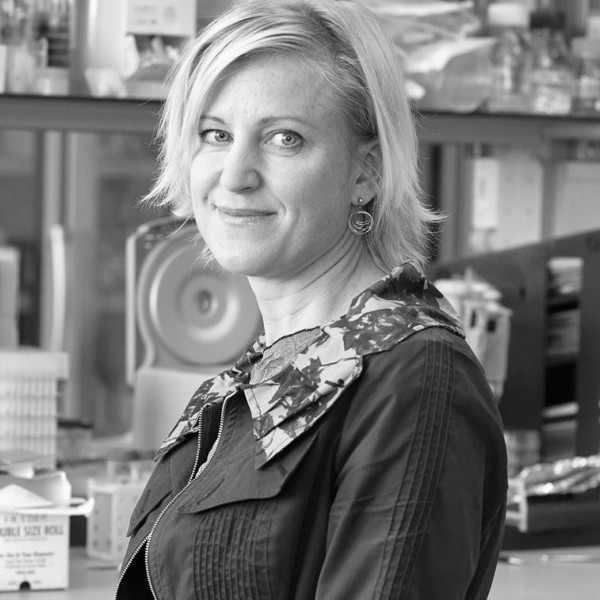Melody A. Swartz is the William B. Ogden Professor in the Pritzker School of Molecular Engineering at the University of Chicago, where she holds a joint appointment in the Ben May Department for Cancer Research. She obtained her BS from Johns Hopkins and PhD from MIT, both in chemical engineering, and carried out postdoctoral work at Harvard Medical School and the Brigham & Women’s Hospital.
She started her independent career as an assistant professor at Northwestern University in the Department of Biomedical Engineering before moving to the Ecole Polytechnique Fédérale de Lausanne (EPFL), where she was promoted to full professor and eventually served as director of the Institute of Bioengineering.
Trained as a bioengineer, Prof. Swartz uses quantitative approaches in immunobiology and physiology, including biotransport and biomechanics, to develop a deeper understanding of how the lymphatic system regulates immunity in homeostasis and disease, particularly in cancer and chronic inflammation. Her lab applies this knowledge to develop novel immunotherapeutic approaches in cancer, including lymph node-targeting vaccine approaches, as well as in vitro model systems that recapitulate relevant features of the tumor-immune interface.
Among her many honors, Swartz was elected to the National Academy of Engineering in 2023, National Academy of Medicine in 2020, elected to the American Academy of Arts and Sciences in 2018, and named a MacArthur Fellow in 2012.
Swartz’s research focuses on elucidating and exploiting the roles of lymphatic function as it relates to cancer and chronic inflammatory diseases including asthma, using a variety of interdisciplinary approaches from bioengineering, immunobiology, physiology, cell biology and biomechanics. Her lab works in both basic hypothesis-driven research as well as in translational applications.
A major interest has been to understand the immunological implications of lymphangiogenesis in tumors and other chronic inflammatory conditions, including allergic airway disease. Other current projects include elucidating new immunological functions of lymphatic endothelium and developing novel strategies for targeting the lymphatics and sentinel lymph nodes for immunotherapy. Building novel, physiologically relevant, 3D model systems for recapitulating key features of interest in tumor and lymphatic microenvironments has been an integral part of this research program, and they use those models in complementary ways with mouse models to gain new insight into tumor cell invasion and metastasis.
Adjuvant-free immunization with infective filarial larvae as lymphatic homing antigen carriers.
Card C, Wilson DS, Hirosue S, Rincon-Restrepo M, de Titta A, Güç E, Martin C, Bain O, Swartz MA, & Kilarski WW. Adjuvant-free immunization with infective filarial larvae as lymphatic homing antigen carriers. Sci Rep 10, 1055 (2020).
Tumor-associated factors are enriched in lymphatic exudate compared to plasma in metastatic melanoma
Broggi MAS, Maillat L, Clement CC, Bordry N, Corthésy P, Auger A, Matter M, Hamelin R, Potin L, Demurtas D, Romano E, Harari A, Speiser DE, Santambrogio L, Swartz MA. Tumor-associated factors are enriched in lymphatic exudate compared to plasma in metastatic melanoma. Journal of Experimental Medicine. 2019.
Tumor lymphangiogenesis promotes T cell infiltration and potentiates immunotherapy in melanoma
Fankhauser M*, Broggi MAS*, Potin L, Bordry N, Jeanbart L, Lund QW, Da Costa E, Hauert S, Rincon-Restrepo M, Tremblay C, Cabello E, Homicsko K, Michielin O, Hanahan D, Speiser DE and Swartz MA. Tumor lymphangiogenesis promotes T cell infiltration and potentiates immunotherapy in melanoma. Science Translational Medicine. 2017.
Transcellular Pathways
Triacca V, Guc E, Kilarski WW, Pisano M, Swartz MA. Transcellular Pathways. Circulation Research. 2017.
Exploiting lymphatic vessels for immunomodulation: Rationale, opportunities, and challenges
Maisel K, Sasso MS, Potin L, Swartz MA. Exploiting lymphatic vessels for immunomodulation: Rationale, opportunities, and challenges. Advanced Drug Delivery Reviews. 2017.
